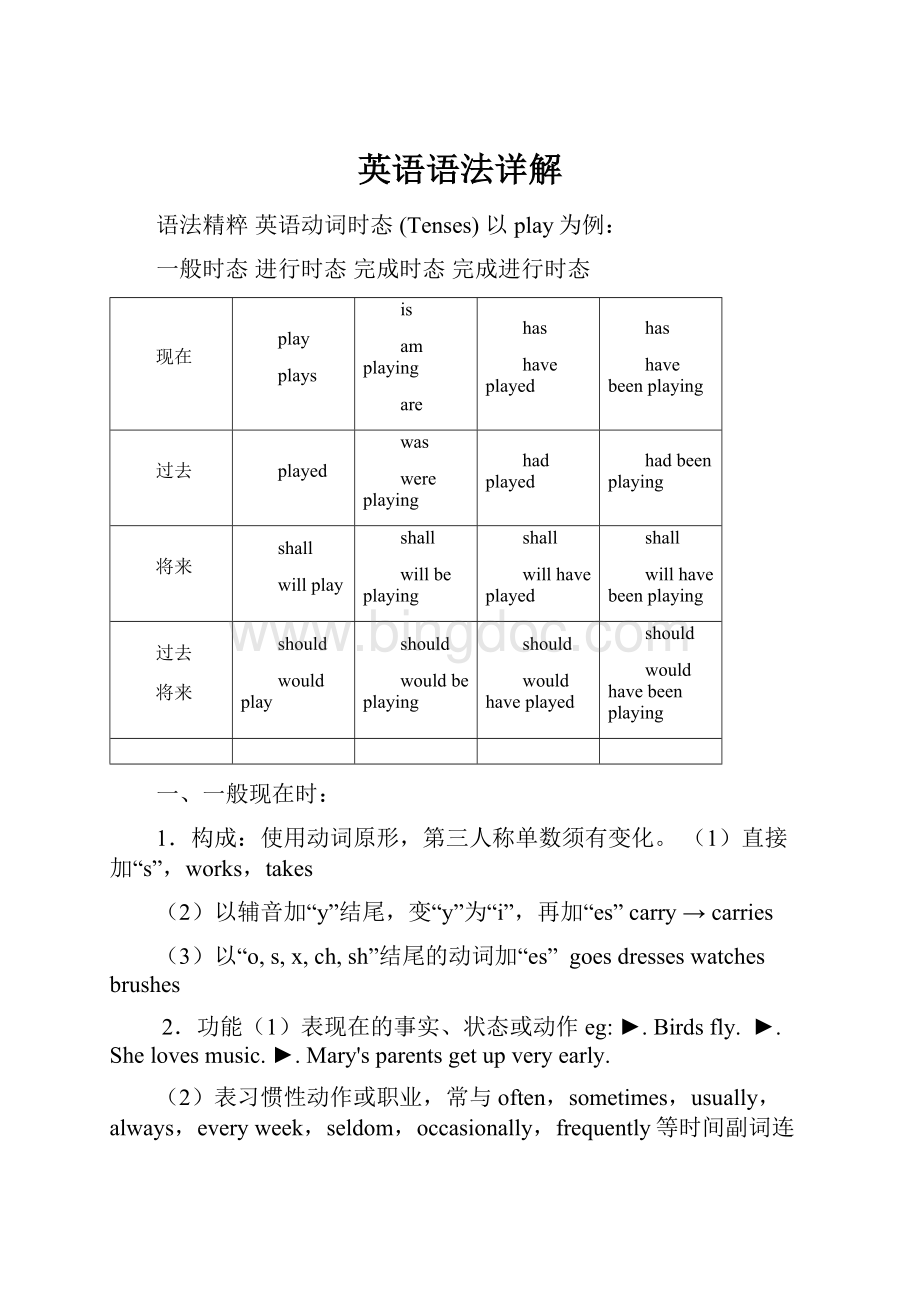英语语法详解Word格式文档下载.docx
《英语语法详解Word格式文档下载.docx》由会员分享,可在线阅读,更多相关《英语语法详解Word格式文档下载.docx(95页珍藏版)》请在冰点文库上搜索。

willbeplaying
willhaveplayed
willhavebeenplaying
should
wouldplay
wouldbeplaying
wouldhaveplayed
wouldhavebeenplaying
一、一般现在时:
1.构成:
使用动词原形,第三人称单数须有变化。
(1)直接加“s”,works,takes
(2)以辅音加“y”结尾,变“y”为“i”,再加“es”carry→carries
(3)以“o,s,x,ch,sh”结尾的动词加“es”goesdresseswatchesbrushes
2.功能
(1)表现在的事实、状态或动作eg:
►.Birdsfly.►.Shelovesmusic.►.Mary'
sparentsgetupveryearly.
(2)表习惯性动作或职业,常与often,sometimes,usually,always,everyweek,seldom,occasionally,frequently等时间副词连用。
eg:
►.Ialwaystakeawalkaftersupper.►.Shewritestomeveryoften.►.Tomandhisgirlfriendgoouttotakeapicnicoccasionally.
(3)表客观真理,格言警句或事实:
►.Theearthmovesroundthesun.►.Thesunrisesintheeastandsetsinthewest.►.Twoandtwomakesfour.►.Nomanbuterrs.人非圣贤,熟能无过。
(4)表将来:
A.在由when,after,before,as,assoonas,although,because,if,evenif,incase,till,until,unless,solongas,where,whatever,wherever等引导的状语从句中用一般现在时表将来发生的动作。
例如:
►.I'
lltellherwhenshecomestomorrow.►.Evenifitrainsthisafternoon,I'
llmeetyou.
►.Whateverhappens,youshouldkeepcool-headed.►.I'
llberightherewaitingforyouwhereveryougo.
B.按时间表、将要发生的动作或事件,用一般现在时表达将来时概念。
►.Theplaybeginsat6:
30thisevening.
►.Whendoestheplanetakeoff?
►.Heleavesforthatcitynextweek►.Accordingtothetimetable,theexpresstraintoShanghaistartsatnineinthemorning.(按照时刻表,开往上海的特快列车早上7点出发。
)
1.TheBrowns________anicecarandBrown'
sbrother________anicejeep.
A.have/haveB.has/hasC.have/hasD.has/have
2.Iftheirhouse________notlikeours,what________itlooklike?
A.is/isB.is/doesC.does/doesD.does/is
3.-________youthinkhewillcome?
-Ifit________tomorrow,hewillnotcome.
A.Do/rainsB.Are/rainsC.Do/willrainD.Are/willrain
4.Thelittlechild________notevenknowthatthemoon________aroundtheearth.
A.do/moveB.do/movesC.does/movesD.did/moved
5.Manyastudent________fondoffilms,butagoodstudentseldom________tothecinema
A.are/goesB.is/goesC.are/goD.is/go
二.现在进行时:
is/am/are+现在分词
1.表示现在正在进行的动作。
如►.Thekettleisboiling.ShallImaketea?
►.Don'
tyouthinkyoueattoomuch?
You'
reputtingonweight►.Theworkersarebuildinganewbridgeacrosstheriver.
2表现阶段正进行的动作►.Heistakingphysicsthissemester►.Wearepreparingforourfinalexaminationthisweek.
3.go,come,leave,arrive,land,meet,die,start,return,join,etc.用于进行时态时表示即将开始的动作。
►.Look!
Thebusiscoming.看!
车来了!
►.Theoldmanisseriouslyill,andheisdying.
►.AliceisleavingforBeijingwithhermother.
4.与always,forever,continually,constantly等副词连用,表示说话人带有感情色彩:
赞赏或厌恶。
►.Heisalwaysthinkingofothers.(他总是想着别人。
)►.Theboyiscontinuallymakingnoises.(这男孩不断地发出吵闹声。
)►.Theteacherisconstantly(always)criticizingherforbeinglate.(老师一直在批评她迟到。
5.下面表示状态、感觉、情绪、精神活动的动词不可用于进行时。
believe(相信),doubt(怀疑),see(看见),hear(听见),know(知道),understand(理解),belong(属于),think(认为),consider(认为),feel(觉得),look(看起来),seem(看上去),show(显示),mind(介意),have(有),sound(听起来),taste(尝起来),require(要求),possess(拥有),care(关心),like(喜欢),hate(讨厌),love(喜爱),detest(憎恨),desire(意欲)
●注意:
haveaparty/thinkabout可以用进行时,因为这里have意为“举行”;
think意为“考虑”。
1.Howcanyou________Ifyouarenot________?
A.listening/hearingB.hear/listeningC.belistening/heardD.behearing/listeningto
2.Thegirlevenwon'
thaveherlunchbeforeshe________herhomework.
A.willfinishB.isfinishingC.hadfinishedD.finishes
3.Thosewhohaveappliedforthepost(职位)________intheoffice.(此题超前)
A.arebeinginterviewedB.areinterviewingC.interviewingD.tobeinterviewing
4.Theoldscientist________todomoreforthecountry.
A.iswishingB.hasbeenwishingC.wishesD.hasbeenwished
5.Ifhe________,don'
twakehimup.
A.stillsleepsB.isstillsleepingC.stillhasbeensleepingD.willbesleepingstill
三.一般过去时。
定义动词的过去式:
1.表示过去某个特定时间或某一段时间发生的动作或情况。
►.Wevisitedtheschoollastspring.►.IwenttoschoolbybikewhenIwasinmiddleschool.
►.Chinawasfoundedin1949.
2在表示时间或条件等的状语从句中代替过去将来时►.Shetoldmethatshewouldnotgowithusifitrainedthenextday.►.Theywouldnotleaveuntilshecameback.►.Myfriendpromisedtomarrymeonceshemadeherfinaldecision.
3.一般过去时,现在时和过去时的几组差异:
●Herbrotherwasachemist.(已去世)
●Herbrotherisachemist.(尚健在)●That'
sallIhadtosay.(话已说完)
●That'
sallIhavetosay.(言之未尽)●Itwassonicetoseeyou.(离别时用)
●Itissonicetoseeyou.(见面时用)●Janedidalotofworkthismorning.(已是当天下午或晚上)
●Janehasdonealotofworkthismorning.(仍是上午)测试精编I:
(用所给动词的正确进态填空)。
1.YesterdayI________(think)thatyouwerenotinBeijing.2.Aliceusually________(sit)inthefrontoftheclassroom,butshe________(sit)atthebackthismorning.3.He________(tell)thenewstousthreedaysago.
4.He________(begin)toteachChinesein1990.5.shewouldnottelephonemeifshe________(have)notime.
1.They________thetripuntiltherainstopped.
A.continuedB.didn'
tcontinueC.hadn'
tcontinuedD.wouldcontinue
2.Thelocalpeasantsgavethesoldiersclothesandfoodwithoutwhichthey________ofhungerandcold.(without在这里表条件,你知道吗?
)A.woulddieB.willdieC.wouldbedeadD.wouldhavedied
3.ItwasnotuntilthenthatIcametoknowthattheearth________aroundthesun.
A.movedB.hasmovedC.willmoveD.moves
4.Whenallthosepresent(到场者)________hebeganhislecture.(重点题)
A.sitB.setC.seatedD.wereseated
5.IfIhadhadtime,Iwouldhavewrittentoyou.ButinfactI________not.
A.haveB.wouldhaveC.hadD.hadhad
四.过去进行时:
were/was+现在分词。
1.表示过去某一时刻或阶段正在发生的动作。
►.Iwasplayingchessat8yesterdayevening.
►.WhenIarrived,theywerewatchingTV.►.Theyweredoinghouseworkthistimelastweek.
2.用于条件状语从句中表示过去将来进行的动作。
►.Shetoldmetowakehimupifshewassleeping.
►.IaskedmyfriendtowarnmeaboutitaslongasIwasdrivingtoofast.
3.过去某时将发生的事。
►.TheytoldmethattheywereleavingforNewYork.►.HewasgoingoutwhenIarrived.
1.Mybrother________whilehe________hisbicycleandhurthimself.
A.fell/wasridingB.feel/wereridingC.hadfallen/rodeD.hadfallen/wasriding
2.He________hislegashe________inafootballmatch.
A.broke/playedB.wasbreaking/wasplayingC.broke/wasplayingD.wasbreaking/played
3.-Myfatherwillbeheretomorrow.-Ithoughtthathe________today.
A.wascorningB.iscomingC.willcomeD.comes
4.Jackwasgoingoutoftheshopwhenhecollidedwithanoldwomanwho________in.
A.comeB.wascomingC.hadbeencomingD.hadcome
5.Michikecouldn'
tcometothetelephonewhenMr.Smithcalledherbecauseshe________inthelab.
A.hadbeenworkingB.hasbeenworkingC.wasworkingD.worked
五.现在完成时:
have/has+过去分词
1.表示过去所发生的动作对现在的影响或产生的结果。
常与yet,just,before,recently,lately(最近),ever,never等表时间的副词搭配使用。
●Hehasn'
tseenherlately.●Ihaven'
tfinishedthebookyet.
2.表示一个从过去某个时间开始,延续到现在并可能持续下去的动作,常与表示一段时间的时间状语连用。
如:
sofar(迄今为止),uptillnow(直到现在),since,foralongtime(很长时间),uptopresent(直到现在),inthepast/inthelastfewyears(在过去的几年里),thesedays(目前)……►.Hehasworkedherefor15years.
►.IhavestudiedEnglishsinceIcamehere.►.TheforeignerhasbeenawayfromChinaforalongtime.
►.Sofar,Ihaven'
treceivedasingleletterfrommybrother.
3.某些非延续性动词(即:
动作开始便终止的动词),在现在完成时中不能与表示一段时间状语搭配。
黄金要点:
I.常见的非延续动词:
die,arrive(到达),join(加入),leave(离开),go,refuse(拒绝),fail(失败),finish,buy,marry,divorce(离婚),awake(醒),buy,borrow,lend...II.这类动词并非不能用现在完成时,而是不能接常由for引导的时间状语。
III.但若是用在否定句中,非延续动词的现在完成时可以与表示一段时间的状语连用。
●Shehasgoneawayforamonth.(误)●Shehasbeenawayforamonth(正)
●Themanhasdiedfortwoyears.(误)●Themanhasbeendeadfortwoyears.(正)
●Howlonghaveyouboughtthebook?
(误)●Howlonghaveyougotthebook.(正)
4.注意since的用法:
►.Theyhaven'
thadanytroublesincetheycamehere.►.Ithasbeentenyearssincewemetlasttime.►.Hehasbeenheresince1980.►.Hehasbeenheresincetenyearsago.
5.几组对比:
HehasgonetoShanghai.他到上海去了。
HehasbeentoShanghai.他去过上海。
Shehasgone.她已走了。
Sheisgone.她缺席了。
(or她死了。
Thedoorhasbeenclosed.门关上了。
(动作)Thedoorisclosed.门是关着的。
(状态)
1.Theprices________goingupallthetimeinthepastfewyears.
A.keepB.keptC.havekeptD.arekeeping
2.Forthewholeperiodoftwomonths,there________noraininthisarea.
A.isB.willbeC.hasbeenD.havebeen
3.TodayisJane'
sweddingday.She________John.
A.havejustmarriedwithB.wasjustmarriedtoC.hasjustbeenmarriedtoD.justhasbeenmarriedto
4.Nowondertheflowerhavewithered,they________anywaterforages.
A.hadn'
tB.haven'
tC.haven'
thadD.hadn'
thad
5.Nowadayscomputer________awideapplicationwiththedevelopmentofproductionandscience.
A.foundB.hasfoundC.findsD.hadfound
六.现在完成进行时:
have/has+been+现在分词
1.表示从过去某时开始发生,一直延续到现在且可能延续下去的动作。
►.I'
vebeenwaitingforanhourbutshehasn'
tcome.►.Hehasbeenrunningafterherfor8years.
2.表某种感情色彩。
vebeenwantingtoseeyouforsomanyyears.►.Who'
sbeentellingyousuchnonsense.
现在完成时与现在完成进行时的对比:
现在完成时强调“结果”,而完成进行时强调“动作的延续”。
►.Ihavethoughtofit.(我已想到了这一点。
)►.Ihavebeenthinkingofit.(我一直在想这一点。
►.Jimhaspaintedthedoor.(杰姆已将门油漆过了。
)►.Jimhasbeenpaintingthedoor.(杰姆一直在油漆门。
1.They________ussincefiveo'
clockthismorning.
A.arehelpingB.hav